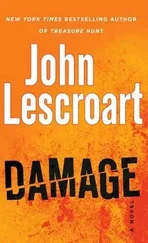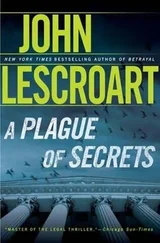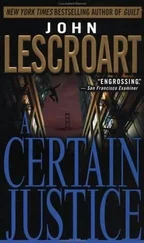Anna turned around to wave good-bye, and we proceeded back through the cellar, which was now brightly lit and stunning in color as well as fragrance. Another walk through the tunnel, and we reappeared in Lupa’s rooms.
I sat across from him. The weight of my friend’s death had begun to settle on me again. I must have looked tired.
“What are your ideas?” Lupa had gone to an oversize, overstuffed chair. “I’d like a beer,” he said, but he didn’t get up.
“I’d like some sleep,” I said. We spoke in English.
“I’d say you need it. But first, what do you think of St. Etienne and our list of suspects?”
“That’s been bothering me,” I said. “I mean the fact that it looks like the man we’re after is a friend of mine. Going on that assumption, everyone has a plausible opportunity, but . . .” I stopped.
He grunted. “It begins to look that way.”
“More than you know,” I said.
I got up, walked out to the kitchen and up the stairs, ordered two beers at the bar, and returned. He nodded graciously when I handed him a bottle, and took a long drink.
“I detest drinking beer from a bottle, but what can one do?” He drank again. “More than I know?”
“List our suspects,” I said. “Paul Anser lives in St. Etienne. Georges Lavoie delivers there, as does Henri Pulis—I would assume even to the arsenal itself. Georges with his first-aid supplies and Henri, of course, with his food. It’s one of those newfangled buildings where the workers have their own cafeteria and medical facility. I’ve heard Tania talk about it.”
“Tania?”
“That’s the worst part.”
He finished his beer and waited.
“One of Tania’s oldest acquaintances, through her husband, who was a French officer . . . Anyway, one of their friends was Maurice Ponty, who happens to be the director of the St. Etienne arms factory. She still sees him about once a month.”
Lupa leaned back in his chair and sighed deeply. “That’s everyone.”
“Except Fritz.”
“No, not except Fritz.”
“You have something on him,” I asked, “some connection?”
Lupa shook his head. “I was loath to consider him because of his cooking. He is so sympathetique . Still, that is a flaw in my own method.”
“But you just said you have nothing on him.”
“Nothing definite, Jules, but certainly something. It stretches the bounds of coincidence that every one of your guests has some foreign connection. Until I have satisfied myself with Fritz’s references in Germany before the war began, I have to include him among the suspects. I have a man working on it now.”
“But what possible . . . ?” I began.
“Jules, please. I must suspect everyone.”
“Even me?”
He was young. A look of ineffable sadness crossed his countenance. “I’m afraid, my new friend, even you.”
I stood up. “The beer is terrible, but it isn’t that. I must be getting on home. Would you like me to have Fritz send up a case of my beer, if it wouldn’t spook you?”
“That would be excellent,” he said, lifting the corners of his mouth in what perhaps he thought was a broad smile.
“Meanwhile, I’ll get some sleep and then try and contact everyone and see what I can find.”
Lupa seemed to consider something, then stopped me from leaving by raising his hand. “Jules,” he said, “a small point, but in English the word ‘contact’ should never be used as a verb.”
“Au revoir,” I replied with dignity, then turned on my heels, left him, and began walking home through the gray and dismal afternoon.

Stones crunched noisily under my feet as I trudged homeward, the sound a somber coda to the theme playing over and over in my mind. Lupa had said, “I must suspect everyone,” and he was right. I walked slowly, hands deep in my pockets, head down.
Everyone . . .
I thought of the word as a sledgehammer pounding into the wall of reluctance I had built against suspicion of my friends. And they had been my friends, every one of them. Now, until this was all over, they would not be friends, and they might never be again.
I remembered how it had all begun, with Paul Anser. It had been in Paris around 1911. What had he been doing there? Ah yes, publishing something. He did actually publish poetry. I had two or three of his bound collections and even an autographed manuscript at the house. There had been a party, I recall, with lots of young men from London taking the Grand Tour, as well as several charming young women. I had the feeling that I’d been asked to chaperon, but that suited me. The crowd was lively and intelligent, a far cry from the stultifying soirees held by the wives of military men to further their husbands’ careers.
Paul had been the entertainment, or part of it, and he was well received. Afterward, though, when most of the younger set had paired off, I had seen him standing alone, looking rather at sea, and I took pity on him. His command of French then was not so good as it has become, and we spoke English, discovering to our mutual delight that we were neighbors. When he had returned to Valence several weeks later, he had called on me while Marcel had been visiting, and we’d had such a good time drinking beer and—significantly?—talking politics that we all decided to make a regular event of it.
So it had been Paul, Marcel, and me from the start. Seen from a certain perspective, and one that I had truthfully never considered until this moment, it had been, or could have been, a most fertile field for espionage. Back in the beginning, we’d all shared the common confidences of new-found friends. Had it all been masterful grilling on Paul’s part?
I thought back. I had aired my disagreements over policy rather freely. Marcel had done the same. To the extent that Paul had been fascinated, hanging on our words, we had felt flattered, viewing him with friendly condescension. Those naive, neutral, isolationist Americans, we had thought. Now I bitterly recast the litany in my mind: we naive, romantic, gullible French!
Dark rain clouds scudded against the overcast sky. I had been wandering, lost in contemplation. Though Valence wasn’t a particularly large city, I found myself in an unknown neighborhood as a light drizzle began to fall. Ancient houses leaned threateningly over narrow stone streets. I considered turning around, trying to retrace my route, but since I’d been paying no attention whatever, I realized that I was truly lost. Turning back wouldn’t help. There was nothing to do but continue walking, hoping I would stumble upon some familiar landmark.
Everyone . . .
Henri had been the next. It had come about naturally enough, since I bought my beer-making supplies from his shop. I remember the first time we’d gotten into a discussion of technique. He had a particularly dependable supplier of excellent German hops. German hops! His interest was so genuine, his personality so forthright, that I had spontaneously decided to ask him around.
And he became the most regular of the guests. His attendance was never in doubt, which, now that I thought of it, was provocative. With a wife and a large family as well as a prospering business, he might have been expected to have the most demands on his time. Instead, our weekly gatherings were obviously a matter of great priority to him.
Why, just the past night he’d left his wife in the middle of a disagreement, as Lupa had pointed out. Were our beer meetings more important to him than his domestic harmony? And if they were, why?
Again I reflected on his bluff exterior—a happy, life-loving Greek. And the more I thought on it, the more incongruous were his business successes and his easy camaraderie with our varied and rather highbrow group.
Читать дальше













